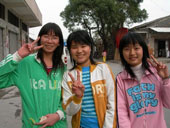F.O.B. in NYC: Study examines impact of bias on young Asian immigrants “I was F.O.B. and that’s why I was forced to stay out of school for years,”says Katherine Gansico. Born in the Philippines, she says she took a three-year hiatus from college after she first arrived in the United States in 1999 because she was constantly harassed on campus for being an immigrant, or “fresh-off-the-boat.” When Katherine and her family settled in New York City, she decided to enroll at the Staten Island campus of St. John’s University in order to finish her Bachelors Degree. She was shy, but it was the way she spoke with a distinct Filipino accent, and the way she dressed, that made her peers look down on her harshly. Gansico sadly recalls, “I contacted the Chairman of the International Student Office, but he insisted that it was all in my head!” She endured what she describes as obvious social exclusion- classmates blatantly ignoring her- that eventually gave way to “blunt confrontations” which, she said, usually left her in tears. “They’d talk about me behind my back, mock my accent and literally look me up and down as though I was some kind of alien,” she says angrily. “I remember there was one boy who called me an F.O.B. and told me to go back home.” She continuously reported the incidents to the same department, but to no avail. According to her, after awhile it became too overwhelming and traumatizing, “and I just couldn’t take it anymore so I left.” Dominic Scianna, Director of Media Relations for the university, said recently that the International Student Office exists to help students but that school officials were not able to retrieve any of Gansico's records, most likely because the incidents took place so long ago. Today, Gansico still has the same questions that haunted her years ago: Was it really discrimination? And how has it affected her- mentally and physically?
A Study to Spot What’s Been Under the Radar Because now, a St. John’s research team is nearing the final stages of a special year-long study concerning the physical and mental effects of discrimination on South and East Asians. The study looks at everything from high blood pressure patterns to psychological defects. Though Gansico is not part of the study, many other Filipino victims of discrimination who may have otherwise remained silent or gone unnoticed like Gansico, now have an opportunity to be heard. With more than 65,000 Filipinos living in New York City, according to the NYC Department of Planning, and very few mainstream media reports on Filipino discrimination, there is bound to be a large amount of cases that the public just doesn’t know about. The research team consists of Graduate Assistants Jahanara Ullah, Jenni Atencio, Jasmin Kwok, and led by Dr. Elizabeth Brondolo, Atencio said, “Many people believe this myth, that Asians have just easily assimilated into society and that’s why there have been few harassment reports in the news, but more studies are needed in order to understand the underlying problems and concerns that they are facing in New York City today.” Both Atencio, a Filipino American, and Kwok, a Chinese American, had had experiences involving discrimination and suggested to Brondolo that a study be conducted in order to see how common (or not) their experiences were amongst other Asians. Brondolo’s study features a 34-part “Perceived Ethnic Discriminatory Questionnaire” (PEDQ) that asks participants about specific pieces of behavior related to social exclusion, social stigmatization, workplace discrimination and harassment. The study doesn’t randomly select participants, but rather visits communities that are heavily populated by Asians. Though data is still coming in, according to Brondolo, 96% of the 300+ participants so far have reported experiences of discrimination. “Social exclusion is the most commonly reported in the community, which for example would be something like ‘people say nice things to my face but bad things when I’m not around.” More importantly, she said that the study has shown that “there is, indeed, a relationship between the exposure to discrimination and depression, anxiety and poor health.” There hasn’t been a large Filipino sample, however, which could indicate many things about the community in terms of how Filipinos might perceive discrimination or, socially, which kinds of Filipinos are more subject to discrimination. Are the victims of the upper class? College graduates? Middle-aged? All of these kinds of characteristics are important and the research team makes sure to ask participants of their socioeconomic status, their country of origin, their level of education and their income in order to make their conclusions as specific as possible. Brondolo, a Ph.D and Psychology Professor at St. John’s Queens’ campus, first gained interest in this investigation involving discrimination and health when she was doing research with Black and Latino New York City Traffic Agents. “They were an excellent model for interpersonal conflict, as the public doesn’t normally like to get traffic tickets,” she said. She captured their blood pressures during their contact with the public and conducted stress management groups for them. The Asian communities study recently was housed in Flushing Hospital, but will be moving to a number of different sites in Jamaica, Queens this fall. Dr. Brondolo said that all of the data will be ready for release next spring. Then, she says, “I’m hoping we can develop some educational materials and biomedical- applying all of the natural sciences- biology, biochemistry, etc. -intervention materials that these communities can use in order to realize how detrimental this issue is.” For Gansico, the damage of discrimination has lived on after the traumatizing incidents at St. John’s. Although her life has moved forward- new friends, eventually going back to school, a job at a Manhattan insurance company- she can still vividly remember her first experiences in the United States with disgust, regret and sadness. “I’m okay these days, you know,” she said, “but there are some parts of me that still cannot move on in peace.” |
|


